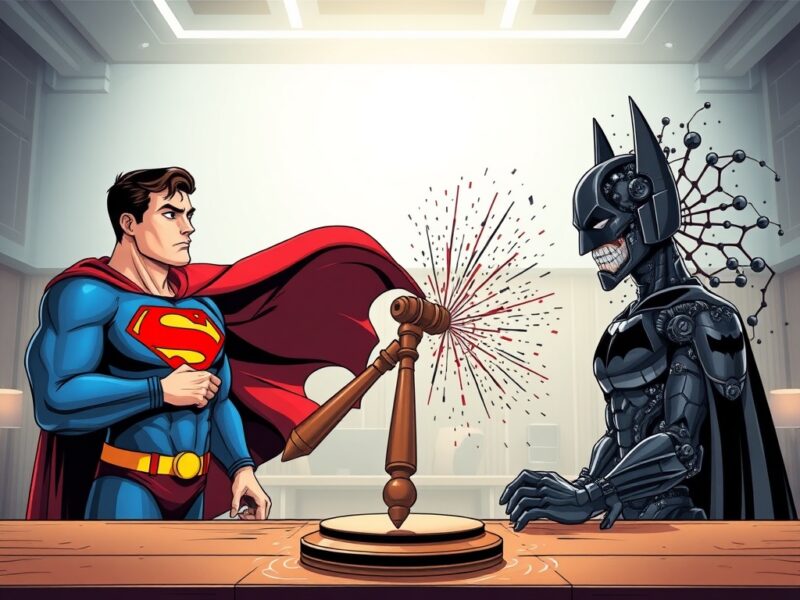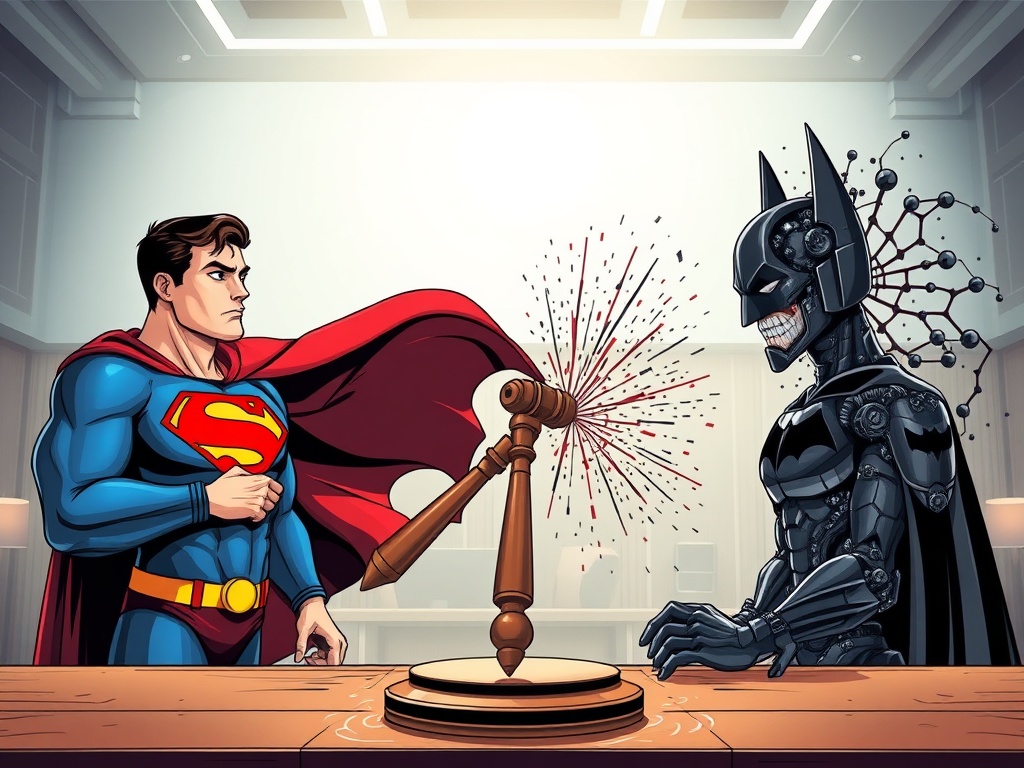AI Copyright Battle: Warner Bros. Unleashes Legal Fury on Midjourney
0
0

BitcoinWorld

AI Copyright Battle: Warner Bros. Unleashes Legal Fury on Midjourney
In the rapidly evolving digital landscape, where the lines between creation and replication blur, a monumental legal battle is unfolding that could redefine ownership in the age of artificial intelligence. For those invested in digital assets and the future of creative works, the ongoing AI copyright dispute between entertainment behemoth Warner Bros. and AI art generator Midjourney isn’t just news; it’s a potential harbinger for how we perceive and protect value in the digital realm. This clash over iconic characters like Superman and Batman raises crucial questions about originality, infringement, and the very foundation of intellectual property in a world increasingly powered by generative AI.
The Escalating AI Copyright Battle
Warner Bros. has launched a significant lawsuit against AI startup Midjourney, alleging rampant copyright infringement. The core of the complaint centers on Midjourney’s platform allowing users to create images and videos of beloved characters such as Superman, Batman, and Bugs Bunny without any authorization from the rights holder. This isn’t a minor oversight, according to Warner Bros.; it’s a deliberate and “profit-driven decision” by Midjourney.
The lawsuit highlights a critical point: Warner Bros. claims that Midjourney was previously more cautious, restricting users from generating infringing content. However, these protections were reportedly lifted, opening the floodgates for unauthorized character renditions. The complaint articulates the studio’s frustration, stating, “Midjourney has made a calculated and profit-driven decision to offer zero protection for copyright owners even though Midjourney knows about the breathtaking scope of its piracy and copyright infringement.” The entertainment giant is seeking not only unspecified damages but also the return of any profits derived from the alleged infringement and a permanent halt to future violations.
Understanding the Midjourney Lawsuit: A Deep Dive
This isn’t an isolated incident. The Midjourney lawsuit follows a similar legal challenge initiated in June by Walt Disney and Universal, which also targeted Midjourney for unauthorized use of characters like Darth Vader, Bart Simpson, and Shrek. These cases collectively underscore a growing tension between traditional content creators and the burgeoning generative AI industry.
Midjourney’s primary defense in these cases has been the “fair use doctrine” under U.S. copyright law. This doctrine permits limited use of copyrighted material without acquiring permission from the rights holders, typically for purposes such as criticism, comment, news reporting, teaching, scholarship, or research. However, the application of fair use to generative AI, especially when commercial profit is involved, is a hotly contested area. The courts will need to weigh several factors:
- Purpose and Character of the Use: Is it transformative or merely reproductive?
- Nature of the Copyrighted Work: Is it factual or creative?
- Amount and Substantiality of the Portion Used: How much of the original work is taken?
- Effect of the Use Upon the Potential Market for or Value of the Copyrighted Work: Does it harm the market for the original?
Midjourney’s lack of public comment on this specific lawsuit leaves much to speculation regarding their detailed legal strategy, but their prior arguments suggest a firm belief in the transformative nature of AI-generated content.
Generative AI and the Future of Intellectual Property
The rise of generative AI technologies has introduced unprecedented challenges to existing intellectual property frameworks. While these tools offer incredible creative potential, their ability to mimic, adapt, and combine existing works without explicit licensing raises significant legal and ethical questions. For content creators, studios, and artists, the concern is clear: how can they protect their unique creations when AI can so easily generate similar or derivative works?
This debate extends beyond just images. AI models are trained on vast datasets, often scraping billions of pieces of content from the internet, including copyrighted text, music, and video. The core legal question revolves around whether this training process itself constitutes copyright infringement, or if the outputs generated by these models infringe upon existing works. The outcome of lawsuits like Warner Bros. vs. Midjourney could set crucial precedents for:
- The legality of AI model training on copyrighted data.
- The definition of “transformative” use in the context of AI-generated content.
- The responsibilities of AI platform providers in preventing infringement.
- The future licensing models for AI tools and their outputs.
The entertainment industry, a major player in the global economy, is particularly vulnerable to these disruptions, making these lawsuits a high-stakes affair.
The Stakes for Warner Bros Lawsuit and Beyond
The Warner Bros lawsuit is not just about a few images; it’s a fight for the fundamental principles of creative ownership in the digital age. If Warner Bros. prevails, it could significantly impact how AI art generators operate, potentially forcing them to implement stricter content filters, negotiate licensing deals, or even pay royalties for the use of copyrighted material in their training data or outputs. Conversely, if Midjourney’s fair use defense holds, it could empower AI developers and users, potentially loosening restrictions on what can be created and shared using these powerful tools.
The implications extend far beyond Hollywood:
- For AI Developers: A loss for Midjourney could necessitate a complete overhaul of training data acquisition and content moderation policies, potentially stifling innovation or increasing development costs.
- For Artists and Creators: A victory for Warner Bros. could provide a stronger legal shield against unauthorized AI replication, offering more security for their creative output.
- For Consumers: The availability and nature of AI-generated content could change, with potential restrictions on what users can prompt or generate.
This legal battle is a bellwether for the broader tech and entertainment industries, determining who controls the narrative and the value of digital creativity.
Protecting Intellectual Property in the Digital Age
The ongoing legal skirmishes highlight the urgent need for clearer guidelines and potentially new legislation regarding intellectual property in the context of generative AI. While existing copyright laws offer a framework, their application to novel AI technologies often leads to ambiguity and complex interpretations.
For creators and businesses, protecting their intellectual property in this new era requires a multi-faceted approach:
| Strategy | Description |
|---|---|
| Proactive Registration | Registering copyrights for original works remains the strongest defense against infringement. |
| Clear Licensing | Developing clear licensing agreements for data used in AI training and for AI-generated outputs. |
| Technological Safeguards | Exploring technologies like watermarking, digital rights management (DRM), or blockchain-based provenance for digital assets. |
| Industry Collaboration | Working with AI developers and legal experts to establish industry best practices and ethical guidelines. |
The dialogue between tech innovators and content owners is crucial. Finding a balance that fosters creativity and technological advancement while respecting the rights of original creators will be key to navigating this complex legal landscape.
The lawsuit brought by Warner Bros. against Midjourney represents a pivotal moment in the ongoing discussion surrounding AI and copyright. As generative AI continues to evolve, its impact on creative industries and the concept of ownership will only intensify. The outcome of this and similar cases will undoubtedly shape the future of digital content creation, intellectual property law, and the responsibilities of AI platforms. It’s a testament to the profound shifts occurring as technology pushes the boundaries of what’s possible, forcing a reevaluation of established legal and ethical norms. For anyone interested in the future of digital assets and creative expression, this is a legal battle worth watching closely.
To learn more about the latest AI market trends, explore our article on key developments shaping AI features.
This post AI Copyright Battle: Warner Bros. Unleashes Legal Fury on Midjourney first appeared on BitcoinWorld and is written by Editorial Team
0
0
 Manage all your crypto, NFT and DeFi from one place
Manage all your crypto, NFT and DeFi from one placeSecurely connect the portfolio you’re using to start.




